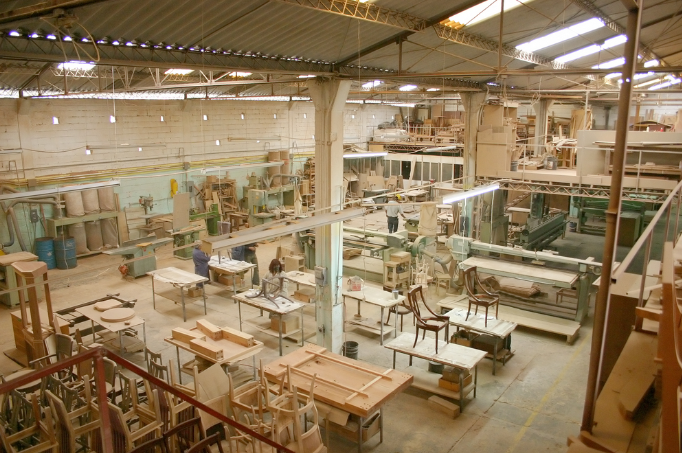Is your manufacturing company looking for a way to streamline operations, boost productivity, and reduce costs? If so, a centralized Enterprise Resource Planning (ERP) platform can help you achieve those aims, among others. Yet, before partnering with just any vendor, it helps to understand your industry’s unique needs.
Today, we’re taking a closer look at how ERP software can help manufacturers transform their enterprise from the inside out and which system features and capabilities they should prioritize in their quest to find the right solution. By keeping these 15 considerations top of mind, you’ll be able to initiate a successful project and move forward in confidence.
Don’t have time to read the blog? Watch the short video instead.
Benefits of Manufacturing ERP Software
What industry-specific benefits can manufacturers expect to gain with an ERP implementation? After all, this is one of the most dynamic and competitive realms, requiring software that keeps efficiencies high, costs low, and customers satisfied.
With ERP, one of the top functions is the ability to automate core business processes, ensuring they’re not only quicker to perform but also more consistent. This not only lowers overall operational costs but also streamlines and simplifies data exchange.
From development and design to production and procurement, all teams are working from the same central platform. With around-the-clock access, stakeholders can enjoy more accurate updates, quicker communication times and more informed decision-making.
At the same time, ERP solutions also allow manufacturers to perform real-time data analyses, which enables them to understand and respond to market conditions more quickly and competitively. As a result of these combined efforts, these companies are better equipped to deliver on customer expectations, especially turnaround and delivery times, which ultimately helps build their bottom line.
15 Features and Functions to Look For In Your Next Manufacturing ERP Software Solution
Now that we’ve covered why manufacturers need an ERP, let’s dive into another part of the process: How can you make sure you’re choosing the right solution? Are there certain aspects you should prioritize over others?
It’s no secret that the market is flooded with different vendors, programs, and specializations. As you take this first step forward, let’s take a look at 15 considerations to keep in mind.
1. Issue Identification
One of the main reasons manufacturers implement ERP solutions? With a single data repository, it becomes easier than ever to identify and resolve manufacturing issues.
To this end, look for a system that offers the ability to thoroughly track the history of each product. You should be able to link together product specification data, quality assurance records, and testing results to identify the precise touchpoint where the error occurred.
This way, you can take a proactive approach to issue resolution, rather than a reactive one, where the stakes are higher and costlier. When this kind of system is in place, designers are freer to focus on the creative and technical aspects of product development rather than spending a majority of their time assisting corrective efforts.
2. Inventory Cost Management
There’s no denying the financial toll that’s taken when manufacturers carry inventory beyond their current needs. Imagine the savings you could amass if you were able to take a leaner approach to inventory management.
With the right ERP system, you can.
Look for one that is both versatile and user-friendly, enabling you to see where your levels need to be. You should be able to quickly download the reports necessary to help guide your inventory carrying requirements and maintain appropriate levels.
3. Advanced Pricing Models
One of the aspects that many manufacturers must consider is how to price their bids as competitively as possible to establish new relationships and win new work.
Even being off by a minimal amount could place one bid behind another. This is why it’s best to find an ERP system that includes sophisticated pricing and reporting features. When you’re able to replace manual calculation methods with automated alternatives, you can eliminate the risk of user error and ensure that pricing models are consistent and competitive across the board.
4. Robust Transaction Capacity
As you dive into the myriad options for ERP software for the manufacturing, you’ll find that there are platforms available for nearly every business size.
As such, make sure to verify that the system you choose is large and robust enough to keep up with your current and future business needs. Can it help you meet your transactional volume now, as well as down the road as you grow and scale? The system you choose should help you grow seamlessly and organically, without the need to invest in additional resources to support your infrastructure.
5. Unify and Simplify Terminology
As a company, how do you establish and communicate your key performance indicators (KPIs)? Does your project management team define success in one way, while your sales and marketing departments look at it differently?
An ERP system can help you establish one version of numbers that the entire company can reference and work toward as a collective group. Moreover, it allows you to share these metrics with every employee across every department, so everyone is on the same page and working toward the same goal.
While not everyone will be tasked with the same objectives, they can reference your enterprise-wide, cross-functional KPIs to understand where you expect the company to be. They can also access new mission-critical reports, including product profitability analyses, to understand how close they are to meeting those goals.
6. Data Extraction Flexibility
Your boss asks you to pull a report on last year’s inventory levels compared to today’s. Can you do it in a matter of a few seconds and clicks, or do you need to set aside a few hours to pull those numbers manually?
You should be able to quickly locate and extract precisely the data you need when you need it. In the manufacturing niche, these reports can make all the difference between intelligent decision-making and a hasty, uncertain approach. Prioritize an ERP system that includes rich reporting capabilities, including the ability to customize your reports as needed and flag specific items to discuss later.
At the same time, while being able to manually manipulate your reports is key, the system should also possess a degree of self-governance. For instance, you should be able to set the software to calculate re-order levels as necessary to ensure your inventory levels never dip.
7. Data Accessibility
Accessible data is just as important as flexible data.
From your customer support representatives to your C-suite executives, the data needs across your organization will understandably vary. The one factor that remains universal? These employees might need different forms of intelligence, but they all need it as quickly as possible.
With an ERP system, you’ll be able to access the information you need in a matter of seconds. This automation replaces the need for manual legacy systems and files that are cumbersome to maintain and nearly impossible to organize. This empowers every team member to answer any question quickly, confidently and in greater detail than before.
8. Standardization Across Divisions
Manufacturers with efforts spread across various departments and divisions are especially poised to benefit from the efficiencies that ERP systems provide. This is because this platform standardizes business processes, reduces or eliminates redundancy, and aligns efforts for the greater good of the business.
At the departmental level, this facilitates better teamwork and clears channels of communication. At a higher level, it helps to manufacture executives better engage with users and take a more process-based approach to management, rather than spending a majority of their time fine-tuning system components.
9. Stronger Supplier Scorecards
Does your manufacturing company use supplier scorecards to rate suppliers and keep track of open issues?
If so, you know that while this resource can be valuable, it’s undeniably cumbersome to keep track of every scorecard manually. This is another area in which a manufacturing-specific ERP solution can help.
When you bring these scorecards online and integrate the functionality into your system, you can easily see and report on key metrics, such as the number of issues encountered in a given month. The system can automatically add points onto each scorecard or remove them based on supplier performance. In addition, most will allow you to instantly see the impact (if any) that the non-conformance had on your customer.
10. Improved Team Capacity
Another one of the top benefits of ERP in manufacturing? When time-consuming, back-end functions are replaced with automated methods, teams can take on more work without growing in headcount.
The increase in productivity levels means that your company can accept more orders and respond to requests from customers without stretching themselves too thin or hiring new employees.
11. Production Schedule Adjustments
What would you do if the president of your company called and asked you to put a certain product on the line tomorrow? Would you be able to respond quickly and affirmatively to the request, or would it require hours of re-working your current setup?
The most robust manufacturing ERP software systems enable you to answer this question in a matter of seconds. During the conversation, you can simply run an inquiry and check your stock status. If you have enough on hand, you can fulfill the demand on the spot. If not, you can check the open purchase orders and deliver an informed response on when the material will arrive.
12. Easier Order Receiving and Entry
In years past, only a select few employees would know when an order was received. Now, the entire enterprise can be privy to this update, including key purchasers.
Along the same lines, your order entry times are also exponentially improved. With ERP software, as soon as a new order hits the system, the necessary parts required to build the order are allocated almost immediately. This greatly expedites a timeframe that traditionally took weeks to catalyze.
13. Improved Workforce Scheduling
How are you currently scheduling your workforce and allocating your resources? Are their efforts aligned with your company’s needs?
With an ERP system, you can easily see when one work center is being worked to maximum capacity, and another is being underutilized. In response, you can reassign key resources to help balance the load without affecting output capacity. Most will allow you visibility into overall workplace capacity, helping to improve company-wide planning and scheduling efforts.
14. Ensure Regulatory Compliance
The manufacturing industry is replete with compliance requirements that span the technical, legal and corporate realms. Key regulatory bodies help establish guidelines that team members must follow as they produce and market their products. This applies across the entire industry but is especially evident in the Food and Beverage (F&B) manufacturing sector.
Without ERP, it can be difficult for F&B leaders or any other team member to prove compliance at every turn. This is because using an intranet-based filing system or paper chain is unreliable at best and inaccurate at worst. When companies implement an ERP solution, they can bring these files online, where they’re stored and saved forever.
From there, they can create and maintain real-time records that prove every compliance step, including those taken in response to company-based Standard Operating Procedures (SOPs). These keep teams on track and help safeguard your company in the event of an audit.
15. Greater Customer Details
Are your customer service reps equipped with the data they need to handle the customer requests they receive?
Whether it’s a troubleshooting request or an inquiry for more information, these team members should have every answer they require at the tip of their fingers. This is where an ERP platform shines.
With this centralized data platform, your reps can see a customer’s complete history in a matter of seconds. This includes purchases they’ve made, conversations they’ve initiated, complaints they’ve issued and more. According to research, companies that excel at customer service outperform their competitors by 80%, and with ERP, your team can easily meet this need.
Find Success With Manufacturing ERP Software
In the fast-paced manufacturing industry, any software that improves visibility enables accessibility and empowers your workforce is one to consider.
These are a few of the top features to look for in any manufacturing ERP software solution. As you continue to explore your options and consider the benefits that are most important to you, it helps to have a seasoned consulting team by your side. As one of the leading 5-Star NetSuite Solution Providers, we’re well-versed in the many aspects of end-to-end ERP solutions and can help guide you toward the right one.
Evaluating ERP for your manufacturing business? Start with a custom NetSuite pricing estimate and expert support from Cumula 3 Group.







